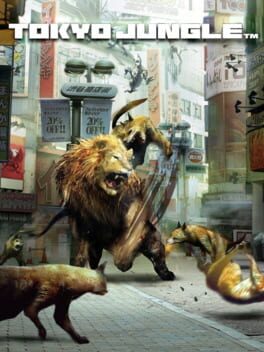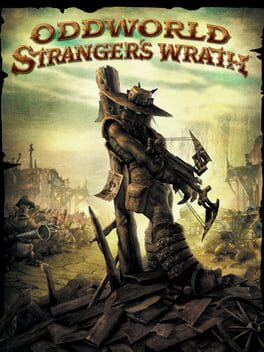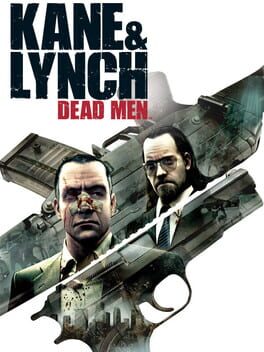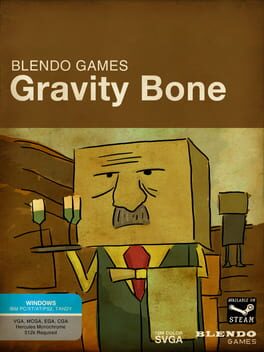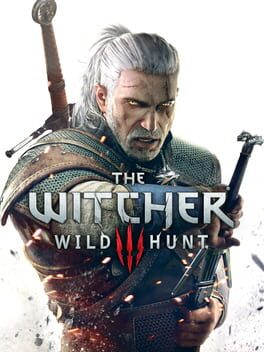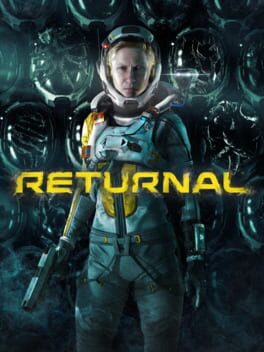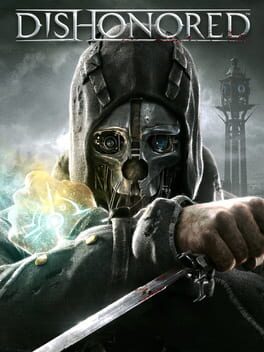sam_gray
2012
The reputation on this one was Japanese and Weird, which is certainly true of a story mode that goes to some crazy places. But it’s the survival mode that best captures Werner Herzog’s view of nature, encouraging "no kinship, no understanding, no mercy". The absurdity of seeing a Pomeranian demolish a gazelle in slow-motion soon gives way to the terror of an empty hunger bar with no food in sight, or being ambushed by a gang of predators, hidden by the cover of rain - with thrumming techno music and stat-boosting challenges further driving the brutal tension of a literal dog-eat-dog world. Its genius lies in the random events and weather changes that discourage any kind of complacency. You must feed, breed, and hide to survive, but most importantly keep moving, as you never know when your section of the city will turn against you. It's clearly the best game ever made about global warming. Buy it while you still can!
A fun, imaginative Western pastiche with an explicit focus on capitalism that eventually morphs into something deeper - one that really acknowledges the racial and historical weight of its American iconography. The other Oddworld games tackle this too, but they're logy where this is three-dimensional, free, and exciting. By default, one of the best games about the transgender experience.
1998
Important, a classic etc. that nonetheless vacillates wildly between being brilliant and infuriating - it’s a bit of a chore to actually play. The top-down perspective makes the actual 3D space irrelevant for large stretches as the radar does the heavy lifting, though there’s still a tendency to get shot from off-screen, and actually aiming at anything is a nightmare. The characters are all quite badly written, vomiting up their backstories and overexplaining every single moment of subtext ad naseum to Snake’s increasingly hilarious bewilderment, leading to exchanges like: “I’m feeling sad.” “Sad?” “Yes, sad. It’s when the endorphins in your brain don’t fire enough, leading to a lack of energy and motivation.” “I didn’t know your brain controlled your feelings...”
But something that still felt fresh was the Codec, where every one of your contacts says something different every time you walk into a different room, or do something notable - e.g. equipping the cigarettes to get scolded, or repeatedly ringing one until they ignore you. There’s a conscious effort to erase the barrier between gameplay and “story”, which is usually treated as a separate, isolated quality in video game criticism instead of inherent to game-feel. I was impressed with the torture sequence - not only is failure here an option, but it’s the more interesting one, undermining the pastiche of Hollywood action heroics and paying off with a suitably down climactic beat. And while I wasn’t always impressed with the boss fights (especially the gimmicky Psycho Mantis) there’s an admirable sense of experimentation in making them all different. The pacing and build-up to each works well, and there’s some effort to complicate our relationship to them as “enemies”, e.g. Grey Wolf embracing pain. (My favourite was Vulcan Raven and his mini gun, which plays to all the strengths of the stealth gameplay.)
Admirably anti-war in its sentiments, also pretentious, sexist, and with laughable stabs at pathos - though this is, as far as I can tell, Hideo Kojima’s whole deal. Auteurism sometimes demands you take the rough with the smooth.
But something that still felt fresh was the Codec, where every one of your contacts says something different every time you walk into a different room, or do something notable - e.g. equipping the cigarettes to get scolded, or repeatedly ringing one until they ignore you. There’s a conscious effort to erase the barrier between gameplay and “story”, which is usually treated as a separate, isolated quality in video game criticism instead of inherent to game-feel. I was impressed with the torture sequence - not only is failure here an option, but it’s the more interesting one, undermining the pastiche of Hollywood action heroics and paying off with a suitably down climactic beat. And while I wasn’t always impressed with the boss fights (especially the gimmicky Psycho Mantis) there’s an admirable sense of experimentation in making them all different. The pacing and build-up to each works well, and there’s some effort to complicate our relationship to them as “enemies”, e.g. Grey Wolf embracing pain. (My favourite was Vulcan Raven and his mini gun, which plays to all the strengths of the stealth gameplay.)
Admirably anti-war in its sentiments, also pretentious, sexist, and with laughable stabs at pathos - though this is, as far as I can tell, Hideo Kojima’s whole deal. Auteurism sometimes demands you take the rough with the smooth.
2022
Likely the most absorbed I've been in a game in a long time (my playthrough clocked in at around 90 hours), so I might have just been so oversaturated by the end that I'm already underrating an instant classic. It reminded me less of Dark Souls than World of Warcraft, with an amazing variety of distinctive zones and enemies designed to catch you off-guard. Everything that's unbalanced and weird about it works in its favour, creating a world with loose rules designed to be broken - Margit is a barrier that teaches you to explore further, Rahdan teaches you that there's no shame in summoning, Malenia teaches you that life is unfair sometimes and then you die. An uncompromising investment in every one of Miyazaki/Fromsoft's pet themes, obsessions, and mechanics, with a real effort made with secondary characters this time around (Iron Fist Alexander MVP). Also just a bit overfamiliar, with a story so vague that it evaporates to nothingness by the end. I don't play these for narrative reasons, though Dark and Demon Souls had a clear purpose in mind with their downward, rotting trajectories, whereas this - with its huge map, buzzing with life - hardly feels like a world in decline. Still probably the coolest game ever made.
Really dug this for a while. The shooting is awkward, but there’s a blunt verisimilitude to the gunfights, an attention to detail with e.g. your teammates giving you ammo when you’re low, or where being revived with adrenaline too frequently leads to an overdose. The game apes Michael Mann better than most, most blatantly with the nightclub shootout - the screaming crowds are a great touch - or the later Heat-inspired getaway on the streets of Tokyo. What it doesn’t attempt to capture is Mann’s romance. There’s no attempt to lend Kane & Lynch’s quest justification of any sort. They’re bad men - in Lynch’s case, bad in a clinically insane kind of way - and the game is at its best when exploring this blackly comedic dynamic, where one tries to rein the other one in but both, predictably, bring out the worst in each other. Unfortunately, the game falls off a cliff at the midway point, turning into an awful guerrilla warfare shooter that’s full of insanely difficult bullshit. But points to its grimy B-movie vibes until then.
Starts off strong, with mercenaries in the Middle East, serious digressions on the war economy, and the genetic horror of Metal Gear Solid 2 taken to its logical end point. War machines braying like cows is wonderfully disturbing, and while the nanomachines are in some respects too-easy solutions to deus ex machina, the idea of every soldier and weapon being subjected to the whims of a cloud-based operating system (with no clear corporate owners) is obviously resonant. The balance between gameplay and cutscene shifts heavily towards the latter compared to earlier entries, but I was surprised by how little this bothered me - I treated it like a multimedia project, and the split-screens and ability to move around the cutscene space in briefings felt inspired, especially the (awesome) divided boss fight with Vamp and the Gekkos.
As is often the case with Kojima, though, a degree of sexism emerges, and the backslide from the (mostly brilliant) politics of Snake Eater is dramatic. A secondary character having her top irrationally unbuttoned the whole time soon pales compared to the Beauty and the Beast corps, some of the most ill-conceived characters I’ve ever seen in a game. It’s possible that these repetitive encounters - with a leering camera, skin-tight character designs, and stupid as shit writing - are a conscious protest against being forced to include fan-pleasing boss fights by corporate overlords. I don’t care - it doesn’t work and it’s gross.
But this grossness gets to the heart of the matter, really, which is that this is a game that seems to hate itself. Or at least the part of itself that glorifies war. While the others indulge in plenty of auteurist smuggling, offering nuanced critique of American foreign policy, nuclear warfare, genetics, etc, they are, on their surface level, entertaining - a power fantasy with guns and gadgets. There are more of those here than ever, but the fantasy is gone, Snake a hacking husk whose adventures are more grim and pointless than ever. How else to justify the awkward gunplay that barely bothers with setting up stealth situations, or the self-parodic repetition of past glories? The fact that the fan-despised Raiden is re-introduced as a supernaturally powerful ninja who ends up losing both his arms and holding his sword between his teeth is part and parcel with the camp ludicrousness of the series, and an indicator of something new - a resentment toward player expectation.
This even extends to the game’s hideous look, embracing the bloom-filled browns that now seem typical of the PS3 era. Perhaps it’s more fascinating now than it was at the time as a time capsule of a different era - a turbulent afterbirth of the War on Terror, and a franchise eating its own tale. The final, long cutscenes are true to form: excessive, silly, but also thoughtful and oddly moving. ("Snake had a hard life..." / "This is good, isn't it?") The worst Metal Gear game I’ve played, and still undeniably touched by genius.
As is often the case with Kojima, though, a degree of sexism emerges, and the backslide from the (mostly brilliant) politics of Snake Eater is dramatic. A secondary character having her top irrationally unbuttoned the whole time soon pales compared to the Beauty and the Beast corps, some of the most ill-conceived characters I’ve ever seen in a game. It’s possible that these repetitive encounters - with a leering camera, skin-tight character designs, and stupid as shit writing - are a conscious protest against being forced to include fan-pleasing boss fights by corporate overlords. I don’t care - it doesn’t work and it’s gross.
But this grossness gets to the heart of the matter, really, which is that this is a game that seems to hate itself. Or at least the part of itself that glorifies war. While the others indulge in plenty of auteurist smuggling, offering nuanced critique of American foreign policy, nuclear warfare, genetics, etc, they are, on their surface level, entertaining - a power fantasy with guns and gadgets. There are more of those here than ever, but the fantasy is gone, Snake a hacking husk whose adventures are more grim and pointless than ever. How else to justify the awkward gunplay that barely bothers with setting up stealth situations, or the self-parodic repetition of past glories? The fact that the fan-despised Raiden is re-introduced as a supernaturally powerful ninja who ends up losing both his arms and holding his sword between his teeth is part and parcel with the camp ludicrousness of the series, and an indicator of something new - a resentment toward player expectation.
This even extends to the game’s hideous look, embracing the bloom-filled browns that now seem typical of the PS3 era. Perhaps it’s more fascinating now than it was at the time as a time capsule of a different era - a turbulent afterbirth of the War on Terror, and a franchise eating its own tale. The final, long cutscenes are true to form: excessive, silly, but also thoughtful and oddly moving. ("Snake had a hard life..." / "This is good, isn't it?") The worst Metal Gear game I’ve played, and still undeniably touched by genius.
2020
The premise implies a procedural whodunnit, à la Phoenix Wright, but it's actually much stranger than that - it's closer to an open-world collect-a-thon, though one where almost every item is important, a key puzzle piece in an overarching mystery. Or rather several, interlinked mysteries; a multiple homicide and missing person at first, then followed by matters of break-ins, sacrifices, genealogy, demonic possession, fanaticism, and every suspect bearing a secret that may or may not implicate them in all of the above. Combine this with the Pynchonian naming conventions (Kafka Memory, anyone?), the vaporwave soundtrack, and a surfeit of red herrings to add flavour, and you have a very strange game, the type of which I've never really encountered before. Compared to Phoenix Wright, the immediate appeal is the freedom. You can visit the suspects in any order, revisit them with new evidence and testimony to uncover a fresh angle, or just keep exploring a gorgeously designed world map. It uses the uncanny nature of a lifeless game world to tie into its theme of religious hubris - the powerful rich using the powerless poor to create their own fantasy of perfection is given an effective, literal analogue here, and the writing is intelligent enough to trust us to understand this without pressing the point too hard. The main issue is that this all becomes clear within the first half of the game, and because of the player-created structure there isn't the same kind of momentum as a traditional whodunnit - the only tension is whether you can hoover up the last bits of evidence. And the trial is a big disappointment, too, especially given how it set up a difficult situation regarding sympathetic (but not blameless) participants in the crime, then sweeps any complications in character relationships under the rug with a truncated epilogue. Still, one of the most ambitious games of recent times - I can't imagine I'll forget it any time soon.
2008
2001
A game about architecture, first and foremost, with the camera either positioning itself at the best angle to reveal the space, or making it clear to the player that they have to explore the offscreen space. Not exactly a masterpiece - the puzzles are sometimes perfunctory, and the combat is actively annoying - but there is something stirring about the hand-holding mechanic, the controller vibrating with Yorda’s every movement. She’s a fragile, real presence, with the standard “escort quest” frustrations - get over here, do that - a conscious part of the experience. (There’s a psychosexual triangle to be drawn between the virginal Yorda, the jealous mother, and possessive teenage boy Ico, whose “horns” are eventually removed/castrated.) All of which to say I found the ending very powerful. The castle we’ve grown so familiar with crumbles, and the power dynamic between the pair reverses - we are made helpless by a beautifully-scored cutscene, the untranslated farewell a perfect note to end on. (The epilogue is a mistake.) Clearly inspired many a developer to make their game as pretentious as possible, though Hidetaka Miyazaki would take the ball and run with it with Boletarian Palace.
So conceptually brilliant it doesn't really require explanation - it distils everything that's good about 30-odd years of Zelda (and Dark Souls, and Shadow of the Colossus, and the Elder Scrolls, etc, etc) and does away with almost everything that's unnecessary. Maybe lacks the weirder edges of Majora's Mask or Twilight Princess, but that's why sequels exist. The barebones story is even rather moving, especially the hunt for memories - it reminded me of something like BS Johnson's The Unfortunates, scattered pieces of a puzzle whose incompleteness is the point. It ends in a place of hope, but acknowledges the sacrifices and failures that paved its way. Which is rare, even for a franchise as thoughtful as this.
The most fun to be had is definitely in the early stages, after you've accepted the awkward combat, animations, character models, writing, etc. A powerful video game hero brought low by using their detective powers to help local townsfolk in oddball mysteries: fine. Fun, even. But the game gradually discourages this by assigning levels to quests, keeping you on the rails of the main plot. And Jesus Christ, what a slog. No wonder most don't even finish it.
It's not like the pursuit of the MacGuffin-y missing person is an uncommon plot device. But this is hardly The Searchers - it's a wild goose chase. I haven't played the previous two games, so it's possible there's an emotional element I'm missing - although as far as I'm aware, Ciri and Yennifer don't even appear in those, as Geralt suffers from amnesia. Perhaps the point is that our main character has finally pieced together his life, and needs that illusive final piece to feel whole again.
But where is that in the writing? There's so much of it here, so much stuff, and almost none of it amounts to anything. Sure, you can get a different cutscene here, a romance there, but the nature of the game is that it wants to flatter you at every turn, give you a chance to try everything. That is, unless you don't play catch enough with your boring daughter - a moral choice that doesn't announce itself as such, which could be bold if there was any attempt at complex human psychology. But no: getting the "bad" ending is a "gotcha!", a conservative scolding that punishes you for supposedly thinking of yourself as the hero, even though the game encourages that line of thinking with Geralt's increasingly cop-like domination over quests with very limited outcomes.
The characters move like mannequins - they repeat themselves, they phase through each other, they whine and curse but seldom feel particularly real. They're all part of the game's arrogance, which uses constant cutscenes and a sat-nav of a minimap to make sure the player does everything they're supposed to. And even if they do, the game might crash or bug out. I'm not surprised that Cyberpunk is bad - this seems to be the accepted state of the open world by this point, something that tells the player to stand in awe of its grand design while resolutely underwhelming on a moment-by-moment basis; until the sloppiness becomes accepted, even routine.
One final thought: what is going on with all the female character designs? It's so blatantly misogynistic that I'm almost surprised there wasn't more uproar. The female soldier who gets told off for continually wearing her blouse open - what is this, the 1960s? Rancid.
It's not like the pursuit of the MacGuffin-y missing person is an uncommon plot device. But this is hardly The Searchers - it's a wild goose chase. I haven't played the previous two games, so it's possible there's an emotional element I'm missing - although as far as I'm aware, Ciri and Yennifer don't even appear in those, as Geralt suffers from amnesia. Perhaps the point is that our main character has finally pieced together his life, and needs that illusive final piece to feel whole again.
But where is that in the writing? There's so much of it here, so much stuff, and almost none of it amounts to anything. Sure, you can get a different cutscene here, a romance there, but the nature of the game is that it wants to flatter you at every turn, give you a chance to try everything. That is, unless you don't play catch enough with your boring daughter - a moral choice that doesn't announce itself as such, which could be bold if there was any attempt at complex human psychology. But no: getting the "bad" ending is a "gotcha!", a conservative scolding that punishes you for supposedly thinking of yourself as the hero, even though the game encourages that line of thinking with Geralt's increasingly cop-like domination over quests with very limited outcomes.
The characters move like mannequins - they repeat themselves, they phase through each other, they whine and curse but seldom feel particularly real. They're all part of the game's arrogance, which uses constant cutscenes and a sat-nav of a minimap to make sure the player does everything they're supposed to. And even if they do, the game might crash or bug out. I'm not surprised that Cyberpunk is bad - this seems to be the accepted state of the open world by this point, something that tells the player to stand in awe of its grand design while resolutely underwhelming on a moment-by-moment basis; until the sloppiness becomes accepted, even routine.
One final thought: what is going on with all the female character designs? It's so blatantly misogynistic that I'm almost surprised there wasn't more uproar. The female soldier who gets told off for continually wearing her blouse open - what is this, the 1960s? Rancid.
2016
In some ways I think this suffers from being Ueda’s most conventional game: the idea is borderline Pixar, there’s a terrible didactic voiceover, and even the score sounds distractingly like Thomas Newman. On the other hand, every bit of frustration and jank is brilliantly incorporated into the game’s design, which takes the most mocked of video game objectives (the escort quest) and takes it to gigantic, spectacular heights, with one of the most convincing companion AIs ever devised. Also found the part where Trico thinks you’re (spoiler) so emotionally affecting I had to stop playing for a while. Which never happens.
2021
A roguelike bullet hell-fusion that I blamed at first for having an intense difficulty based on luck. But it’s really about risk management. You could keep exploring for that perfect gun and perk, but what if you run into a difficult enemy that sets back your precious health bar? You could risk a malfunction that handicaps you in a negligible way, but what if it’s terminal? Very demoralising to play for long periods of time, as every death stings - and unlike Dark Souls, there’s no easy route back to a boss, demanding your full concentration on every run. Also a brilliant, complicated system with no wasted parts, rewarding experimentation and attention to detail. Ends weak, and I wish it didn’t even bother with a narrative, with the stilted horror sequences and ultimate reveal that it’s all a dream or about trauma or something taking the bloom off the rose a bit.
2012
Glad that the whole "binary moral choice" trend has died down, because it's a mistake here. I felt compelled to hinder myself and play the game in a less fun, non-lethal fashion up until the betrayal, at which point I thought it might be interesting to start killing people. Didn't matter - I still got the lame ending where everything is roses and all the robot people love you. It's a credit to the sturdy blink mechanic and open-ended map design that I still liked this game.
